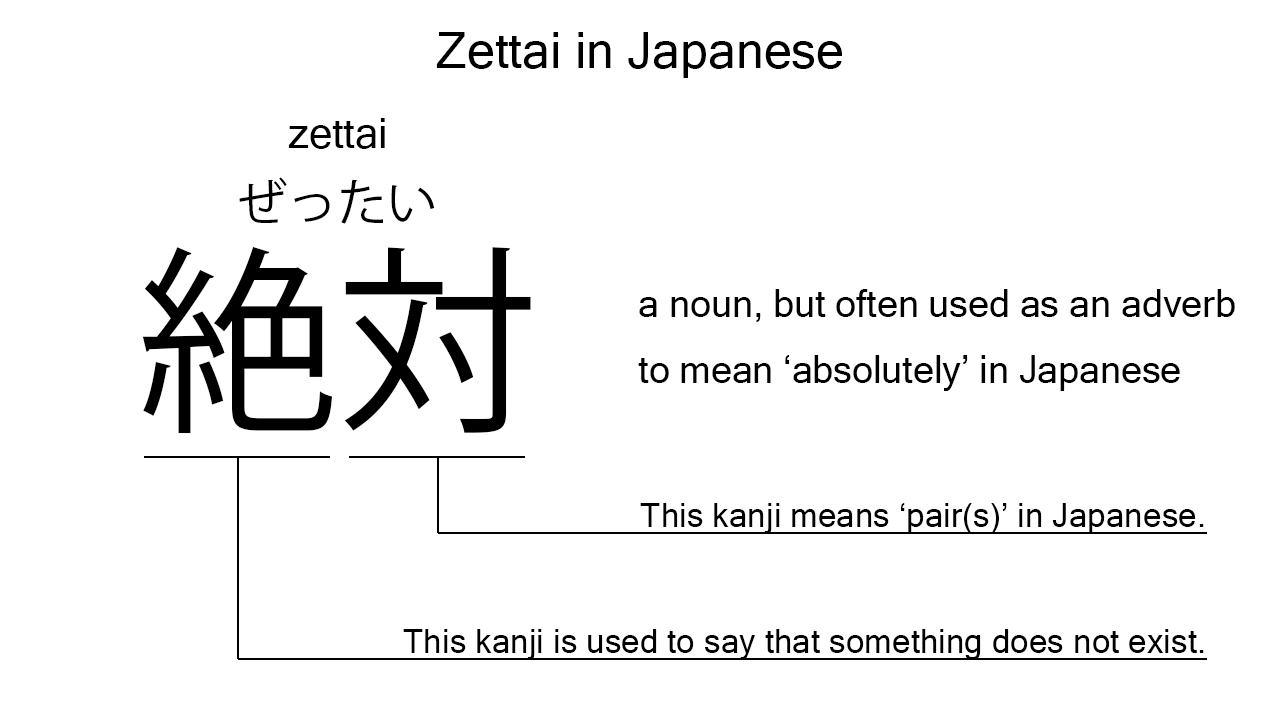What does “zettai” mean in Japanese?
Native speakers say “zettai” often to mean ‘absolutely’ in Japanese. Perhaps, some Japanese learners know this word as it is sometimes used in Japanese conversations. In this blog post, however, I will explain it in detail based on its kanji expression. And also, I will explain how to use it through example sentences. My explanations would help Japanese learners understand “zettai” more clearly. Then, let’s get started!
Contents
Definitions and meanings of “zettai”
Let me start with the definitions and meanings of “zettai”.
- zettai – 絶対 (ぜったい) : a noun, but quite often used as an adverb to say ‘absolutely’, ‘definitely’, or such in Japanese.
Japanese native speakers use this word often as an adverb to make emphasized expressions with adding the meaning of ‘absolutely’, ‘definitely’, or such. When they use this as a noun, it refers to something which cannot be compared to the other things.
The definitions and meanings are not that difficult, I think. To understand this word more clearly, however, let me explain its kanji characters in detail, one by one.
What does “zettai” literally mean in Japanese?
The kanji expression of “zettai” consists of the following two kanji characters:
- 絶 : a kanji character used to say that something does not exist.
- 対 : a kanji character often used to mean ‘pair’ or ‘couple’ in Japanese.
From these two kanji characters, we can understand that “zettai” can refer to a thing which cannot make a pair. This literal interpretation is not completely in line with the actual meanings, but still understandable, I think. A thing which cannot make a pair is most likely something which cannot be compared to the other things.

When we meet new kanji expressions, we should check their kanji characters in detail to understand their meanings clearly and deeply. In many cases, kanji characters tell us a lot about the meanings of the expressions they form. Actually, here, we could get the better understanding of “zettai” through the detailed kanji check above.
So far, I’ve explained the definitions and meanings of “zettai” together with its kanji characters. Then, let me explain how to use it through the example sentences below.
Example #1: how to say “absolutely” in Japanese
kanojo wa zettai kuru to it ta – 彼女は絶対来ると言った (かのじょはぜったいくるといった)
She said she would absolutely come.
Below are the new words used in the example sentence.
- kanojo – 彼女 (かのじょ) : a pronoun meaning ‘she’ in Japanese.
- wa – は : a binding particle working as a case marker or topic marker. In the example, this works after “kanojo” to make the subject in the sentence.
- kuru – 来る (くる) : a verb meaning ‘to come’ in Japanese.
- to – と : a case particle working as a quote marker. In the example, this works after “zettai kuru” to indicate what she said.
- it – 言っ (いっ) : one conjugation of the verb, “iu“, which means ‘to say’, ‘to tell’, or such in Japanese. In the example, it has been conjugated for the better connection with its following word.
- ta – た : an auxiliary verb used after a verb, adjective, or auxiliary verb to make its past tense form. Probably, this is well known as a part of Japanese ta form. In the example, this is used after “it” to make its past tense form, “it ta”.
This is a typical usage of “zettai”. In this example, it works to make the emphasized expression with adding the meaning of ‘absolutely’ in Japanese.
Example #2: another usage of “zettai”
watashi wa yakusoku wo zettai mamoru – 私は約束を絶対守る (わたしはやくそくをぜったいまもる)
I will definitely keep my promise.
Below are the new words used in the example sentence.
- watashi – 私 (わたし) : a pronoun meaning ‘I’ in Japanese.
- yakusoku – 約束 (やくそく) : a noun meaning ‘promise’ in Japanese. This can also work as plural. Learn more about Japanese plural.
- wo – を : a case particle used to make the object word in a sentence. In the example, this is used after “yakusoku” to make the object in the sentence.
- mamoru – 守る (まもる) : a verb meaning ‘to save’, ‘to keep’, ‘to defend’, or such in Japanese. In the example, this works as a part of the commonly-used phrase, “yakusoku wo mamoru”, which literally means ‘to keep a promise’ in Japanese.
This is another typical usage of “zettai”. Again it works to make the emphasized expression, but means ‘definitely’ this time. When we want to say “definitely” or “absolutely” in Japanese, anyway, this word is always a very good option.
Summary
In this blog post, I’ve explained the definitions and meanings of “zettai” in detail based on its kanji expression. And also, I’ve explained how to use it through the example sentences. Let me summarize them as follows.
- zettai – 絶対 (ぜったい) : a noun, but quite often used as an adverb to say ‘absolutely’, ‘definitely’, or such in Japanese. These two kanji characters literally refer to a thing which cannot be compared to the other things. This literal interpretation is not completely in line with the actual meanings, but still understandable, I think. A thing which cannot make a pair is most likely something which cannot be compared to the other things. Indeed, when native speakers use this as a noun, it refers to something which cannot be compared to the other things.
Hope my explanations are understandable and helpful for Japanese learners.